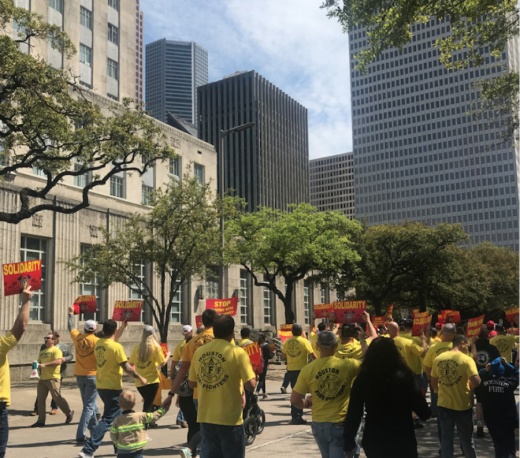Union President Marty Lancton, however, said the proposal is “not even close” to resolving the issues between the Houston Professional Firefighters Association and the mayor. He also claimed he was not consulted by the mayor prior to the announcement which he referred to as a bonus rather than a raise.
“When you don’t have specifics in a contract to know where you’re supposed to be, the law states what the firefighter’s rights are,” Lancton said. “The mayor apparently believes he doesn’t have to follow the law. ... We have a legal process, and he’s not following it.”
The raises, which will bring firefighters’ pay to $21.35 per hour are based on comparisons between Houston and other major Texas cities including Dallas, Fort Worth and San Antonio, Turner said.
Beginning July 1, 6% raises will be distributed over the next three years. Totaling over $115 million, the raises will be funded by the city’s allocation of over $600 million in federal funds provided through the American Rescue Act.
In 2017, the city and the union failed to reach a collective bargaining agreement, which is the legal process for determining a labor contract for the fire department’s employees. As a result, firefighters have gone without raises for over five years. The collective bargaining process would also set other provisions in the contract, such as health and retirement benefits.
The mayor announcing a series of raises over the next three years does not replace the need for both parties to negotiate a contract, said Richard Carlson, a professor at South Texas College of Law, who specializes in collective bargaining law.
“The mayor can’t simply say, 'We're going to solve a problem because we're going to use these funds, and that's the end of it,'” Carlson said.
In the terms of a new contract, Lancton said he and the city need to agree on back pay owed to the firefighters since the dispute began.
Houston Fire Chief Sam Peña defended the decision saying, in the absence of an agreement, the raises put more money into the pockets of firefighters sooner than waiting on both parties to reach an agreement.
“We did the same in 2017 after the expiration of the contract; we implemented an ordinance that maintains a pay rate rather than falling back to whatever state law may require,” Peña said.
Two lawsuits related to the disputes could also upend the mayor’s plans. The first relates to the fire union’s attempt to secure raises comparable to police pay rates through a citywide vote known as Proposition B. Although a district court ruled their attempt unconstitutional, the union appealed the case and is awaiting another ruling. If the union is successful, a new legal decision could require a new pay rate for the firefighters.
Separately, a 2017 lawsuit was settled on May 6, that upheld a provision within state collective bargaining law that states a court can determine pay rates if both parties reach an impasse. The city argued that the provision was unconstitutional and represented an overreach of the court system’s powers, but the provision was upheld. Turner said he has not yet decided if the city will appeal the ruling. If the city does not, the courts could also step in and set a different pay rate.
“It's still a little bit risky because you could say, ‘Well, you know, I'm not going to agree to your terms. We've reached an impasse. We don't have an agreement. So let's let an arbitrator or a judge decide for us,’” Carlson said. “But you don't know what the arbitrator or the judge is going to come up with. It could be in your favor but it's a little bit like going to Las Vegas.”
editor's note: this post has been updated to correct the total raise cost.





